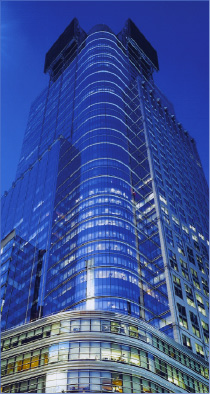


![]()
ONLINE

A Multidisciplinary Approach
Editors’ Note
A graduate of the City College of New York (CCNY) and Harvard Law School, Joe Flom started his legal career as Skadden’s first associate. He is the recipient of multiple honors and awards, including the Legal Aid Society’s Servant of Justice Award (1986), the Federal Bar Council’s Whitney North Seymour Jr. Award (1989), and the Department of Defense’s Distinguished Service Medal (1992). In 2004, he received lifetime achievement awards from Chambers and Partners and The American Lawyer magazine and was presented with the CCNY Presidential Medal for Distinguished Achievement and Public Service. Flom was also awarded honorary doctorates by Queens College and Fordham University and is a founding trustee of the Skadden Fellowship Foundation.
Company Brief
Founded in 1948 and headquartered in New York, Skadden, Arps, Slate, Meagher & Flom LLP (www.skadden.com) is among the world’s most respected law firms. Employing approximately 2,000 lawyers, the firm and its affiliates have offices in nine U.S. cities, as well as in Beijing, Brussels, Frankfurt, Hong Kong, London, Moscow, Munich, Paris, Shanghai, Singapore, Sydney, Tokyo, Toronto, and Vienna.
Has Skadden, Arps’ business been strong in today’s economy?
It sure has. Overall, the business seems to be doing great.
To what do you attribute that strength? Are overseas markets offering growth opportunities?
They’ve been helpful, but it’s our multidisciplinary approach that makes the difference. Litigation is huge, and in M&A activity, while many financial players have been backing off, the more strategic players – who have always been our strength – are still out there.
Have M&A activities become more complex?
Everything is evolving. No two deals are the same. Stockholder makeup is of a different nature today than it was 20 years ago. You have to consider where the stock is held.
Some say the U.S. is losing its competitive edge. Do you agree?
We tend to have more hardening of the arteries than some of the newer developed economies, which makes it harder to get things done. Everybody says, “Not in my backyard,” and if everybody says that, you get nothing done. It’s a problem that we, as a society, have to come to grips with.
How do you differentiate Skadden from other global law firms?
Everything comes down to the people, and nothing is inherited. In a service business, you have to perform every day and provide added value.

The Skadden, Arps, Slate,
Meagher & Flom building in New York
How do you communicate that culture to your employees?
We recognize that we’re in a service business and that we must respond to client needs operating under strict ethical standards. We acknowledge that clients don’t come to us because we’re social butterflies; they come to us because they expect to get the best available legal advice in particular areas, and we reinforce that every day. You have to do a great job all the time, because it’s very easy to lose your client’s respect. You have to tell each generation of employees this to make sure they understand it.
Is Skadden focused on creating opportunities for women and minorities?
We have fostered it from the beginning. When I started to practice law, women were basically confined to trusts and estates. We brought women into litigation and other disciplines early on. We fostered a lot of diversity in the early years, because we needed the talent, and it was also the right thing to do. I am pleased to say we will honor that philosophy going forward through our new Fellows Program at CCNY and our $10 million commitment to form an honors college and prelaw program at CCNY to bring disadvantaged kids into the legal profession. Hopefully, we’ll encourage kids to get into law and give them the background they need to work for one of the major law firms. The board of advisors includes the deans of many major law schools and the general counsel of three of the largest U.S. corporations. It’s something that ought to be done more, and I hope it will have an impact.
Is the firm focused on giving back to the community?
It’s the responsibility of living in our society. If you want to be an institution, you have to act like one. It’s critical that we take steps to help society function on a fully integrated basis.
You have had quite a career in law. Do you take the time to appreciate your success, or are you constantly forging ahead?
Both. Every once in a while, I ask myself how this happened. It just amazes me. But life would be pretty dull if all I did was sit back and remember the past.
Is there a future for that midsize law firm? Or do you really need to have either the global capability or that very niche focus?
There’s room for every kind of organization. And you can’t get to be a big firm unless you get to be midsize first. There are examples of some midsize firms that are now in the top tier. At the same time, the large firms have to look to their constituencies and constantly refill the pipeline, because again, you can’t sell yesterday’s deeds; you’ve got to be selling what you can do today.
If it weren’t for the law, what sort of career would you have liked to have?
I can’t even imagine. I knew when I was six years old where I was going.
You’re still in the office every day. Do you ever think about taking it easy?
I’d be bored to death. My mix of activities has changed significantly. I’m still involved in some major takeovers, but I spend a lot of my time on charitable and political activities. More of my time is devoted to other things.